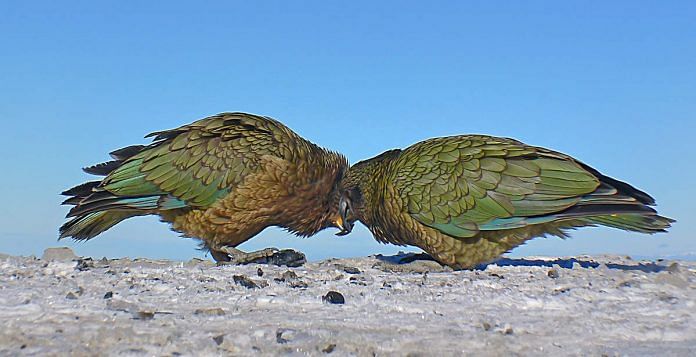
Bengaluru: A new study has found that parrots, just like the great apes, can weigh probabilities when presented with options before making a choice.
Six male birds of the kea, an endangered species from New Zealand and the only known alpine parrot, were used for the study. The parrots were trained to guess one of two coloured-tokens taking into consideration the probability of receiving treats when the right color was chosen.
The study, conducted by researchers Amalia P. M. Bastos & Alex H. Taylor in New Zealand, was published Tuesday in the journal Nature Communications.
How the study was conducted
Under the study, each bird was initially placed in front of the researchers who had two transparent jars filled with black and orange tokens. The researchers picked a token at random from each jar and held it out to the parrot in a closed fist in each hand. The parrots were taught that picking the fist that held a black token resulted in a treat while an orange token produced nothing.
In one experiment, two jars contained a mix of black and orange tokens. In a second experiment, one jar had more black tokens and the other more orange ones.
Each bird was tested 20 times over the two experiments to see which jar’s hands they chose. The team found that three birds exhibited a solid preference for the jar with more black tokens.
In subsequent experiments, when black tokens remained the same in number, but the orange ones went up and down proportionally, four parrots showed a preference for the jar where the orange tokens decreased in number.
Later, in some of the jars, there was a barrier half way up the jar, enabling the researchers to access only the top half. Below the barrier, the black and orange tokens were in equal proportion, but above the barrier, in one of the jars, there were more black tokens than orange.
The birds picked the fists that had picked from the jar with higher upper black proportion.
Also read: Scientists accidentally discover first animal that doesn’t need oxygen to survive
Other observations
Additionally, to test for social skills, the New Zealand researchers wanted to check if the parrots would remember identities of people and associate that with the tokens.
One sampler was asked to pick only black tokens. The parrots caught on to it quickly, developing a sure preference for the closed fist of the person who picked black.
The experiments indicated that the parrots weren’t simply following a stimulus-response, or a conditioning clue. Instead, they actively measured to see which jar had a higher probability of deriving a black token from, and picked the fist that used that jar.
Or, they picked the fist that they knew had a higher chance of throwing up a black token irrespective of the numbers in the jars.
Animal intelligence
Some species of birds have been known to be very smart. Jays and birds belonging to the crow family can use tools for tasks and have been the subjects of many studies.
Parrots have been known to be intelligent previously too. Alex, the African Grey parrot, is perhaps the most famous individual of the species. He was the subject of a 30-year study to understand parrot intelligence. He could understand basic vocabulary, shapes, and colours.
Also read: Scientists discover world’s oldest green algae fossil in China

Parrot astrology is very popular in the south Indian state of Tamilnadu Parrots are trained to pick up cards with predictions
This experiment reported sounds very similar to that